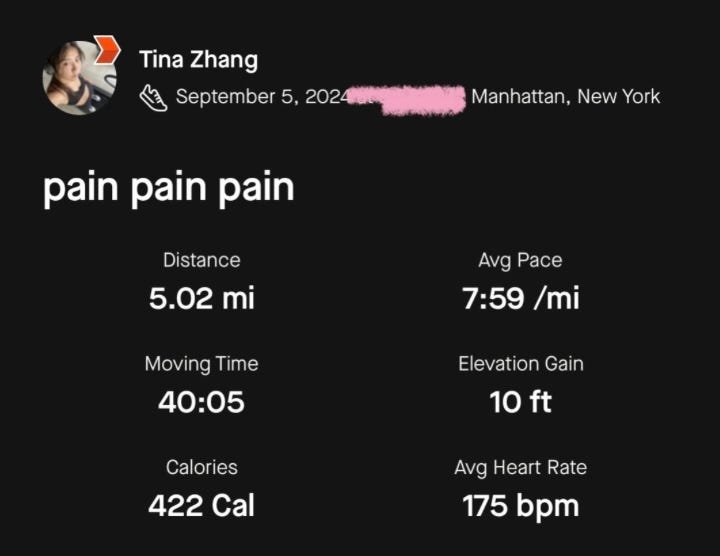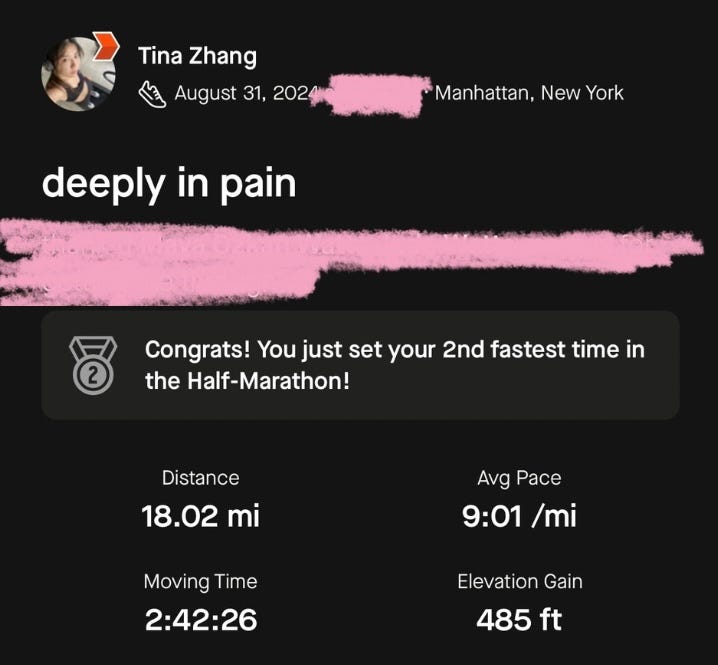In november, I’m running my first marathon. I’m trying not to overthink it, especially on days where a run doesn’t go as I thought it would.
I’d consider myself a hobby runner, but it’s been one of the greatest sources of grounding and consistency in my life. Some of my fondest memories are of finishing a hard run and feeling the sunlight on my face or laughing with lindsay as we loop around mccarren track, giddy with runners high and girly silliness.
I like running because it’s one of the most visible ways to see measurable progress. If I string together enough runs in a row, even if they’re slow, even if I feel terrible, it’s almost inevitable that eventually I’ll be able to run longer, faster.
I also like running because to me, it epitomizes endurance. Lindsay and I used to joke that a cornerstone of chinese values is to “忍着” or in the context it was used throughout my childhood, shut up and endure.
Most of my runs feel like that. I complain and I drag my feet, but as M likes to remind me, the only way out is through.
✦✧✦
Outside of running, I’m a glutton for comfort. I seek comfort in everything: online, in friendships, professionally. I want to be coddled and told that I’m doing amazing. In fact, I want to be surprisingly good at everything, the first time I do it. In other words, a textbook perfectionist.
Almost a year ago to the day, I wrote about doing things that scare you. To my credit, a lot of this month was spent in new intimidating situations. It’s made me realize that most of the time when I’m in a situation that feels scary, it’s actually the unknown and the uncertainty that scare me, and my anxieties turn out to be irrational and unfounded.
But recently, I’ve realized that it’s not enough to put yourself in situations that can potentially be scary, but to (hear me out) actually sometimes feel that fear realized.
The other day, I had a rather embarrassing flop, and it put me into a dizzying nosedive for 3 days. I felt myself spiraling down waves of self-doubt, shame and negativity in a way that felt out of my control. I could logically reason my way out of it, but then, when I least expected it, I’d be hit with an overwhelming wave of embarrassment. In many ways, I was overreacting to a minor blip — but in my head, everyone was sitting behind closed doors thinking what an idiot.
✦✦✧
When I googled chinese values to write this post, “sense of shame” came up in the genAI search results. I was amused and intrigued — turns out the source in question was describing shame in relation to morality (better known as guilt). But in some ways it still rings true.
My therapist often asks me to pinpoint what emotion I’m feeling when I’m in a situation that freaks me out. I used to have trouble parsing through the exact feeling outside of just calling it anxiety. Now I know, that a lot of the time it’s shame, shame, shame.
The thing with failure is that you have to learn from it without extracting meaning. Too often I internalize a failure as something that defines my being, something that I become inextricably tied to, rather than a passing thing I’m experiencing.
✧✦✧
I saw this note from one of my favorite fashion writers,
, where she writes if “you’re not getting rejected or flopping on something at least 3x a week are you really even putting yourself out there”.When I was young, I was afraid of telling people what my goals were — it was one thing to disappoint myself, but to fail in public was unbearable. Even today if you ask me my marathon goal time, I’ll probably say some iteration of oh to just keep running and have a good time (but it’s actually trueee!).
Whenever I’m entering a particularly painful part of a hard run, I like to remind myself that these feelings are both temporary and normal. This makes the pain feel less all consuming, because it’s contained into something I can handle. Whatever I’m feeling has probably been felt by every single person I’ve passed on the west side highway (at some point), and at the end of the day will be over in 10, 30, 90 minutes.
I’ve found “temporary / normal” to be a helpful framing for a lot of the things I struggle with. I often have to remind myself to see things from a growth mindset, rather than seeing failure as a permanent mark on my character. Failure too is temporary and normal — if I’m bad at something, I can get better at it, until one day I’m not bad at it anymore.


✧✦✦
A few weeks ago I went to a fashion week panel, where the speakers were asked what timelessness meant to them. The answers varied from “uncomfortable” to “flexible”, but it reaffirmed for me that in order for us to grow and endure, we have to actively seek out situations where we feel discomfort and frustration. But we also need to be flexible enough to let failure roll off our backs rather than letting it define us.
I once heard a professional runner provide the heuristic that a third of the days that when you’re running you should feel amazing and confident, a third you’ll feel okay and then a third of the workouts will just be ugly. To build endurance in anything (running, an enduring brand) you need to risk resistance and failure, and figure out how to get through it.
I saw a TikTok the other day with a visual of a brain forming a new “groove” when you’re replacing old negative thought patterns with new positive ones. When I studied neuroscience in college, I always loved the concept of neuroplasticity — the idea that my neurons can be fruitlessly firing into the abyss, until one day the neural pathways make a new connection. I like knowing this basis of biology: that the brain is elastic, our cells are continuously dividing, and everything is about growing and forming new connections.









